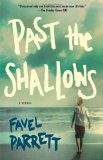Summary | Excerpt | Reading Guide | Reviews | Beyond the Book | Readalikes | Genres & Themes | Author Bio

"I didn't find it. The shark egg."
Joe was struggling with his wet suit, getting his arms free, and he was twisting and panting, not looking at Harry. "Maybe next time," he said, but Harry didn't think it was likely.
When Joe was finally back in his clothes he started unpacking the stuff from the dinghy, the thermos and the tin cups and the rug and the sandwiches. As long as they didn't have to wait for Miles—no, Harry wouldn't be able to wait for Miles even if Joe said he had to because Miles could stay out in the water forever, even if it was freezing, and Harry just had to have one of the sandwiches now.
"This place is old," he said, his mouth full of bread.
Joe made a sound but he wasn't really listening. He was somewhere else, maybe still out there in the water with Miles. But it didn't matter.
This place was old. Harry knew it.
As old as the world.
Chapter Two
Miles got in the dinghy with the men, with Martin and Jeff and Dad, and he didn't speak. No one spoke on the way out to the boat. He hadn't been able to eat his toast at home in the early darkness, and now just at dawn he wished he had.
His stomach was empty, this first day.
First day of school holidays. First day he must man the boat alone while the men go down. Old enough now, he must take his place. Just like his brother before him, he must fill the gap Uncle Nick left.
Because the bank owned the boat now. Because the bank owned everything.
The boat chugged and rattled its way through the heads, and Miles felt the channel grab hold, pull on her hard. She was weak, the Lady Ida, she seemed old now, and the crossing was slow. She plowed through the deepest part of the channel leaving a wide wake of ridges behind, and Miles knew this was where it would have happened. Where Uncle Nick would have been dragged out alone in the dark where the rip ran strongest.
And they never found him.
Not one bit.
Not his boots.
Not his bones.
Just the dinghy floating loose, empty and washed clean.
Nobody talked about it now, but back then Dad talked about it. He said Uncle Nick must have gone out to check the mooring. He said he'd never forgive himself.
The boat was almost new, anchored out at the mouth of the bay because the swell was right up—a big winter swell, and all the boats were out there. But Nick wouldn't leave it alone. He wouldn't stop worrying about the boat. Dad said he went on and on about it at the pub and in the end Dad told him to go and check the damn thing. To go and check it or just shut up about it.
And Miles knew exactly how dark it was that night, the sky blacked out by cloud so thick that nothing came through—no stars or moon or anything. Uncle Nick wouldn't have been able to see the dinghy or the land or even his own hand in front of his face.
And everyone forgot about him out there because that was the night of the crash.
That was the night when everything changed.
Martin touched his shoulder, stood close.
"It'll be all right," he said.
Dad and Jeff were in the cabin and Jeff was staring at him again so Miles looked away. He slipped his yellow windbreaker over his sweater. Dad didn't have any small enough for him, so he had to wear a man's size and it was baggy, hung way down past his hands. It was almost better not to wear one at all. He'd get soaked anyway. The only part of him that would stay warm was his head under the tight wool watch cap that made his scalp itch.
He rolled up the sleeves, he put on his gloves.
Bruny was coming clear in the new light.
Miles watched the surface change color—come to life. And even though they were still out deep, away from land, there were places where the water rose like it was climbing a hill, places where the water was angry. And it wasn't the back of a wave. It wasn't a peak in the swell. It was the current surging into rocks that hid below, rocks that you couldn't see even when the tide was low. And if you didn't know what the rise in water meant, you would never guess those rocks were there. The Hazards. They were called the Hazards of Bruny.
Excerpted from Past the Shallows by Favel Parrett. Copyright © 2014 by Favel Parrett. Excerpted by permission of Washington Square Press. All rights reserved. No part of this excerpt may be reproduced or reprinted without permission in writing from the publisher.
Your guide toexceptional books
BookBrowse seeks out and recommends the best in contemporary fiction and nonfiction—books that not only engage and entertain but also deepen our understanding of ourselves and the world around us.